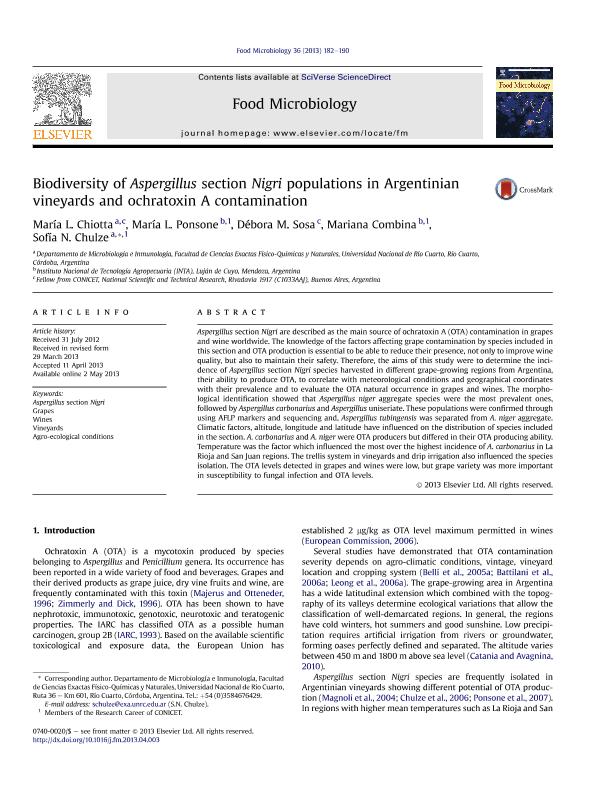Mostrar el registro sencillo del ítem
dc.contributor.author
Chiotta, María Laura

dc.contributor.author
Ponsone, Maria Lorena

dc.contributor.author
Sosa, Débora María

dc.contributor.author
Combina, Mariana

dc.contributor.author
Chulze, Sofia Noemi

dc.date.available
2015-11-13T18:16:30Z
dc.date.issued
2013-12
dc.identifier.citation
Chiotta, María Laura; Ponsone, Maria Lorena; Sosa, Débora María; Combina, Mariana; Chulze, Sofia Noemi; Biodiversity of Aspergillus section Nigri populations in Argentinian vineyards and ochratoxin A contamination; Academic Press Ltd - Elsevier Science Ltd; Food Microbiology; 36; 2; 12-2013; 182-190
dc.identifier.issn
0740-0020
dc.identifier.uri
http://hdl.handle.net/11336/2802
dc.description.abstract
Aspergillus section Nigri are described as the main source of ochratoxin A(OTA) contamination in grapes and wine worldwide. The knowledge of the factors affecting grape contamination by species included in this section and OTA production is essential to be able to reduce their presence, not only to improve wine quality, but also to maintain their safety. Therefore, the aims of this study were to determine the incidence of Aspergillus section Nigri species harvested in different grape-growing regions from Argentina, their ability to produce OTA, to correlate with meteorological conditions and geographical coordinates with their prevalence and to evaluate the OTA natural occurrence in grapes and wines. The morphological identification showed that A. niger aggregate species were the most prevalent ones, followed by A. carbonarius and Aspergillus uniseriate. These populations were confirmed through using AFLP markers and sequencing and, A. tubingensis was separated from A. niger aggregate. Climatic factors, altitude, longitude and latitude have influenced on the distribution of species included in the section. A. carbonarius and A. niger were OTA producers but differed in their OTA producing ability. Temperature was the factor which influenced the most over the highest incidence of A. carbonarius in La Rioja and San Juan regions. The trellis system in vineyards and drip irrigation also influenced the species isolation. The OTA levels detected in grapes and wines were low, but grape variety was more important in susceptibility to fungal infection and OTA levels.
dc.format
application/pdf
dc.language.iso
eng
dc.publisher
Academic Press Ltd - Elsevier Science Ltd

dc.rights
info:eu-repo/semantics/openAccess
dc.rights.uri
https://creativecommons.org/licenses/by-nc-nd/2.5/ar/
dc.subject
AGRO-ECOLOGICAL CONDITIONS
dc.subject
ASPERGILLUS SECTION NIGRI
dc.subject
GRAPES
dc.subject
VINEYARDS
dc.subject
WINES
dc.subject.classification
Micología

dc.subject.classification
Ciencias Biológicas

dc.subject.classification
CIENCIAS NATURALES Y EXACTAS

dc.subject.classification
Horticultura, Viticultura

dc.subject.classification
Agricultura, Silvicultura y Pesca

dc.subject.classification
CIENCIAS AGRÍCOLAS

dc.title
Biodiversity of Aspergillus section Nigri populations in Argentinian vineyards and ochratoxin A contamination
dc.type
info:eu-repo/semantics/article
dc.type
info:ar-repo/semantics/artículo
dc.type
info:eu-repo/semantics/publishedVersion
dc.date.updated
2016-03-30 10:35:44.97925-03
dc.journal.volume
36
dc.journal.number
2
dc.journal.pagination
182-190
dc.journal.pais
Países Bajos

dc.journal.ciudad
Amsterdam
dc.description.fil
Fil: Chiotta, María Laura. Universidad Nacional de Río Cuarto. Facultad de Ciencias Exactas, Fisicoquímicas y Naturales. Departamento de Microbiología e Inmunología; Argentina. Consejo Nacional de Investigaciones Científicas y Técnicas. Centro Científico Tecnológico Córdoba; Argentina
dc.description.fil
Fil: Ponsone, Maria Lorena. Universidad Nacional de Río Cuarto. Facultad de Ciencias Exactas, Fisicoquímicas y Naturales. Departamento de Microbiología e Inmunología. Cátedra de Micología; Argentina. Instituto Nacional de Tecnología Agropecuaria; Argentina
dc.description.fil
Fil: Sosa, Débora María. Universidad Nacional de Río Cuarto. Facultad de Ciencias Exactas, Fisicoquímicas y Naturales. Departamento de Biología Molecular. Sección Química Biológica; Argentina. Consejo Nacional de Investigaciones Científicas y Técnicas. Centro Científico Tecnológico Córdoba; Argentina
dc.description.fil
Fil: Combina, Mariana. Instituto Nacional de Tecnología Agropecuaria. Centro Regional Cuyo Mendoza-San Juan. Estación Experimental Agropecuaria Mendoza. Centro de Estudios Enológicos; Argentina
dc.description.fil
Fil: Chulze, Sofia Noemi. Universidad Nacional de Río Cuarto. Facultad de Ciencias Exactas, Fisicoquímicas y Naturales. Departamento de Microbiología e Inmunología; Argentina
dc.journal.title
Food Microbiology

dc.relation.alternativeid
info:eu-repo/semantics/altIdentifier/doi/http://dx.doi.org/10.1016/j.fm.2013.04.003
dc.relation.alternativeid
info:eu-repo/semantics/altIdentifier/url/http://www.sciencedirect.com/science/article/pii/S0740002013000725
Archivos asociados
